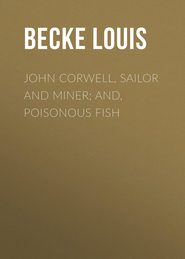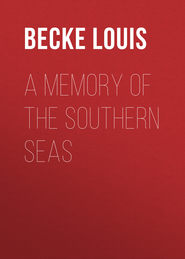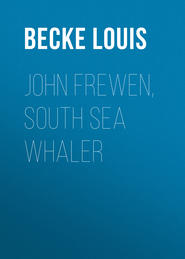По всем вопросам обращайтесь на: info@litportal.ru
(©) 2003-2024.
✖
Tessa
Настройки чтения
Размер шрифта
Высота строк
Поля
“Ay, it would indeed. So far we have been very lucky, however, yet, even if we had missed it, we should have no cause to fear. We have a fine boat, provisions and water, a good crew, and one of the best sailor men that ever trod a deck in command,” and he pointed to the sleeping second mate.
Then as they sat together, listening to the cries of the sea-birds, and waiting for the dawn, Harvey re-told to Tessa, for Roka’s benefit, the story of that dreadful boat voyage sixteen years before, in which his father and five others had perished from hunger and thirst.
“I was but fourteen years of age then, and people wondered how a boy like me survived when strong men had died. They did not know that every one of those thirteen men, unasked by my father, had put aside some portion of their miserable allowance for me, and I, God forgive me for doing so, took it. One man, a big Norwegian, was so fearful of going mad with the agonies of thirst, that he knelt down and offered up a prayer, then he shook hands with us all—my father was already dead—and jumped overboard. We were all too weak to try and save him. And less than an hour afterwards God’s rain came, as my father had said it would come just before he died.”
Atkins, with a last mighty snore, awoke, sat up, and filled his pipe again.
“What, awake, miss!” he said with rough good-humour to Tessa. “How goes it, Mr. Carr?”
“Bully, old man. We’re near the land; we can hear some kanapu about us, so we can’t be more than five or six miles away.”
“The land is there,” said Roka to Harvey, pointing to a dark shadow abeam of the boat, “and we could see it but for the rain-clouds which hide it from us.”
Harvey grasped the steer oar, the crew were aroused, and in another few minutes the boat was under way again, heading for the sombre cloud to the westward under which Roka said the land lay.
And he was right. For as the dawn broke there came to the listening ears in the boat the low hum of the surf upon the coral reef; and then, as the rain-cloud dissolved and vanished to leeward, a long line of coco-palms stood up from the sea three miles away, and the bright golden rays of the rising sun shone upon a beach of snow-white sand, between which and the curling breakers that fell upon the barrier reef there lay a belt of pale green water as smooth as a mountain lake.
“Up with the sail, boys,” cried Harvey, with sparkling eyes, turning to Atkins as he spoke; “the passage into the lagoon is on the south side, just round that high mound of coral, and the native village is on the first islet on this side of the passage. Keep her going, my lads; we shall be drinking young coconuts and stretching our legs in another half an hour.”
The sail was hoisted, and, with five oars assisting, the boat was kept away two or three points, till the entrance to the lagoon was opened out, and the weary voyagers saw before them a scene of quiet beauty and repose that filled their hearts with thankfulness. Nestling under a grove of coco-palms was a village of not more than a dozen thatched houses, whose people had but just awakened to another day of easy labour—labour that was never a task. As Harvey steered the boat in between the coral walls of the narrow passage, two or three thin columns of pale blue smoke ascended from the palm grove, and presently some women and children, clad only in their thick girdles of grass, came out from the houses and walked towards the beach for their morning bathe. Then the click-clack of the oars in the rowlocks made them look seaward, to utter a scream of astonishment at the strange sight of the crowded boat so suddenly appearing before them. In another ten seconds every man, woman, and child in the village—about fifty people all told—were clustered together on the beach, shouting and gesticulating in the most frantic excitement, some of the men rushing into the water, and calling out to the white men to steer clear of several submerged coral boulders which lay directly in the boat’s track.
But their astonishment was intensified when Harvey answered them in their own tongue.
“I thank ye, friends, but I have been to this land of thine many times. Have ye all forgotten me so soon?”
That they had not forgotten was quickly evident, for his name was shouted again and again with eager, welcoming cries as the boat was run up on to the hard, white sand of the shining beach, and he, Atkins, Tessa, and their companions were literally pounced upon by the delighted people and carried up to the headman’s house. Ten minutes later every family was busy preparing food for their unexpected visitors; and pigs, fowls, and ducks were being slaughtered throughout the islet, whilst Tessa and her faithful Maoni were simply overwhelmed with caresses from the women and children, who were anxious to hear the story of their adventures from the time of the burning of the steamer to the moment of their arrival in the lagoon.
Calling the head-man apart Harvey pointed to the body of Morrison, which was then being carried up from the boat.
“Ere we eat and drink, let us think of the dead,” he said.
The kindly-hearted and sympathetic natives at once set to work to dig out a grave beneath a wide-spreading pandanus palm, which grew on the side of the coral mound overlooking the waters of the placid lagoon; whilst some of the women brought Atkins and Harvey clean new mats to serve as a shroud for their dead shipmate.
Then mustering the hands together, Atkins, with Harvey, Roka, and Huka, carried the body to its last resting-place, and Huka, as Latour the steward dropped a handful of the sandy soil into the grave, prayed as he had prayed over the bodies of those who had been buried at sea—simply, yet touchingly—and then the party returned along the narrow palm-shaded path to the village.
Much to Harvey’s satisfaction, the head-man informed him that a trading schooner was expected to reach Pikirami within two or three weeks, as nearly six months had passed since her last visit, and she always came twice a year.
“That will suit us well,” said Harvey to Tessa and Atkins, as they sat in the head-man’s cool, shady house and ate the food that had been brought to them. “We can well wait here for two or three weeks; and the skipper of the Sikiana will be glad enough to earn five or six hundred dollars by giving us a passage to Ponapé. I know him very well; he’s a decent little Dutchman named Westphalen, who has sailed so long in English and American ships that he’s civilised. He was with me, Tessa, when I was sailing the Belle Brandon for your father.”
Soon after noon the crew, after having had a good rest, set to work to overhaul the boat in a large canoe shed, for quite possibly they might have to put to sea in her again, if anything should prevent the Sikiana from calling at the island in a reasonable time.
CHAPTER X
That night as the second mate and his companions were sleeping peacefully under the thatched roofs of the little native village, with nought to disturb their slumbers but the gentle lapping of the waters of the lagoon on the sandy beach, and the ceaseless call of the reef beyond, Hendry and his companion in crime were sitting in their boat talking earnestly.
The captain was steering; Chard sat on the after-thwart, facing him.
“I tell you that I don’t care much what we do, Louis,” said the supercargo, with a reckless laugh, as he looked into the captain’s sullen face. “We’ve made a damned mess of it, and I don’t see how we are to get out of it by going to Ponapé.”
“Then what are we to do?” asked Hendry in a curious, husky voice, for Chard’s mocking, careless manner filled him with a savage hatred, which only his fear of the man made him restrain.
“Let us talk it over quietly, Louis. But take a drink first,” and he handed the captain some rum-and-water. Hendry drank it in gloomy silence, and waited till the supercargo had taken some himself.
“Now, Louis, here is the position. We can’t go to Ponapé, for Atkins will very likely get there as soon as we could, for with light winds such as we have had to-day he would soon pass us with six oars, deep as he is in the water. And even if we got there a week before him, we might not find a ship bound to Sydney or anywhere else.”
“But there is a chance of finding one.”
“True, there is a chance. But there is also a chance of Atkins’s boat being picked up at sea this very day, or the next, or a month hence, and he and his crowd reaching Sydney long before us. And I don’t want to run my neck into the noose that will be waiting there. Neither do you, I suppose?”
“Why in the name of hell do you keep on talking about that?” burst from the captain; “don’t I know it as well as you?”
“Very well, I won’t allude to such an unpleasant possibility—I should say certainty—again,” replied Chard coolly. “But as I was saying, the chances are against us. If we kept on for Ponapé we should either be collared the moment we put foot ashore, or before we get away from there to China or any other place, for Atkins is bound to turn up there, unless, by a stroke of good luck for us, he meets with bad weather, and they all go to the bottom. That’s one chance in our favour.”
“His boat is certainly very deep,” said Hendry musingly, as he nervously stroked his long beard.
“She is; but then she has a kanaka crew, and I never yet heard of a drowned kanaka, any more than I’ve heard of a dead donkey. With a white crew she would stand to run some heavy risks in bad weather, with kanakas she’d keep afloat anyhow.”
Hendry uttered an oath, and tugged at his beard savagely. “Go on, go on, then. Don’t keep harping on the pros and cons.”
“Take another drink, man. Don’t behave like a fretful child. Curse it all! To think of us being euchred so easily by Carr and Atkins! Why, they must have half a boat load of Winchester and Sniders, judging by the way they were firing.... There, drink that, Louis. Oh, if we had had but a couple of those long trade Sniders out of the trade-room!” He struck his clenched fist upon the thwart. “We could have kept our own distance from the second mate, and finished him and his crowd as easily as we did the others.”
“Well, we didn’t have them,” said the captain gloomily; “and if we had thought of getting them, we were neither of us able to stand on our feet after the mauling we got on board.”
Chard drank some more rum, and went on smoking in silence for a few moments; then he resumed:
“You have a wife and family and property in Sydney, and I feel sorry for you, Louis, by God, I do. But for you to think of going there again means certain death, as certain for you as it is for me. But this is what we can do. We have a good boat, and well found, and can steer for the Admiralty Group, where we are dead sure to meet with some of the sperm whalers. From there we can get a passage to Manila, and at Manila you can write to your wife and fix up your future. Get her to sell your house and property quietly, and come and join you there. I daresay,” he laughed mockingly, “she’ll know by the time she gets your letter that you’re not likely to go to Sydney to bring her. And then of course none of her and your friends will think it strange that she should leave Sydney, where your name and mine will be pretty notorious. There’s two Dutch mail boats running to Manila from Sydney—the Atjeh and the Generaal Pel. In six months’ time, after Atkins and Carr get to Sydney, the Motutapu affair will be forgotten, and you and your family can settle down under a new name in some other part of the world. That is what I mean to do, anyway.”
Hendry listened with the closest attention, and something like a sigh escaped from his over-burdened bosom. “I suppose it’s the best thing, Sam.”
“It is the only thing.”
The captain bent down and looked at the compass and thought for a moment.
“About S.W. will be the course for tonight. To-morrow I can tell better when I get the sun and a look at the chart. Anyway, S.W. is within a point or less of a good course for the Admiralty Group.”
He wore the boat’s head round, as Chard eased off the main-sheet in silence, and for the rest of the night they took turn and turn about at the steer-oar.
In the morning a light breeze set in, and the whaleboat slipped over the sunlit sea like a snow-white bird, with the water bubbling and hissing under her clean-cut stem. Then Hendry examined his chart.
“We’ll sight nothing between here and the Admiralty Group, except Greenwich Island, which is right athwart our course.”
“Do you know it?”
“No; but I’ve heard that there is a passage into the lagoon. We might put in and spell there for a day or two; or, if we don’t go inside, we could land anywhere on one of the lee-side islands, and get some young coconuts and a turtle or two.”
“Any natives there?”
“Not any, as far as I know, though I’ve heard that there were a few there about twenty years ago. I expect they have either died out or emigrated to the northward. And if there are any there, and they don’t want us to land, we can go on and leave them alone. We have plenty of provisions for a month, and will get more water than we want every night as long as we are in this cursed rainy belt. What we do want is wind. This breeze has no heart in it, and it looks like a calm before noon, or else it will haul round to the wrong quarter.”











